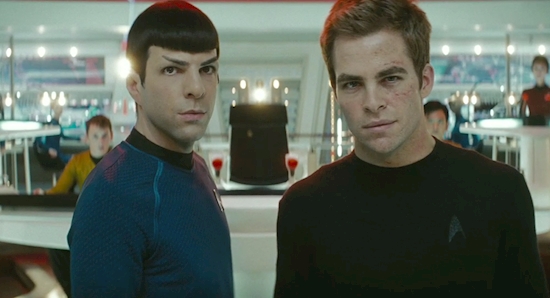I Still Love J.J. Abrams' Star Trek for What It Taught Me About Fandom
There’s a lot to not love about J.J. Abrams’ rebooted Star Trek. There’s the mischaracterization of Jim Kirk (seriously, he’s not that much of a jerk). There’s the treatment of Amanda and Gaila. The destruction of Vulcan. The fact that Abrams himself pretty much used it as an audition to make Star Wars.
And yet, there’s so much I love about it.
I was not a Star Trek fan in 2009. I had seen half of one episode—”The Deadly Years,” though I wouldn’t have been able to name it at the time–and knew bits and bobs from general cultural consumption, like Shatner yelling “KHAAAAAAN” or Spock’s famous “live long and prosper.” I was mostly going to see Sylar from Heroes play Spock.
And then that beautiful opening scene happened. I know the sexist reasoning behind it remains bullshit, but in the moment, as Michael Giacchino’s score soared and Chris Hemsworth’s George Kirk made the ultimate sacrifice to save the crew of the USS Kelvin, including his wife and newborn son, I wept openly.
The rest of the film is a joyous thrill ride, with excellent performances by the new cast as these familiar characters. It’s imperfect and feels less Trek-y than Star Trek Beyond or the original films, but it’s still a delight—a gorgeous to look at, beautifully scored delight that gave me my first proper look into how fan culture functioned.
There’s something magical about the original series of Star Trek to me. It embodies the favored trope of the found family with a boundless optimism. We can look up to Starfleet and see ourselves reflected in Kirk, Spock, Uhura, and Bones. Abrams also tapped into all of our inner lost children by putting Spock and Kirk as outsiders who find themselves among the stars. As a young Kirk watches the Enterprise being built and struggles with the weight of his father’s legacy, who isn’t somewhat moved?
It also has the vast, fandom-y potential of an ensemble cast. Multi-shipping! Characters being best friends! More importantly, characters becoming a family together and always having each other’s backs. There’s a vast canon background for the crew of the USS Enterprise being the closest of friends. The fandom embraced that, giving us what many of us crave in fiction: strong relationships of all varieties between characters who get to have adventures together.
I had previously hovered on the edge of fandom before Star Trek, but this film pushed me into active participation. I wrote fic and metas (no, you’ll never find them). I laughed at the bad memes and weird fanmixes present on ontd_startrek (for those not in the know, that was the hottest Star Trek blog out there). I shared the re-cut of the audiobook that turned the dry novelization into a steamy Kirk/Spock fic. I actually got into shipping a variety of pairs, which gave me so much more fic to choose from, and boy was there good fic.
There’s a lot to both love and hate about fandom. On the one hand, it can be transformative, empowering, and a thread that binds people together. On the other, fandom can exacerbate the worst parts of society, upholding white supremacy and the patriarchy while finding ways to tear down characters of color and women, especially Black women. For every good, there is an equal and opposite evil.
The Star Trek fandom has always changed, and mostly for the better. It did, after all, create the modern version of fandom. I like to think I learned something from the work that fans, old and new, did. It certainly helped me become a cultural critic, so in a way, thank you, J.J., for my current position.
Star Trek is one of those movies that, for all its problems, has burrowed its way into my DNA. It opened up a path for me that previously had been unopened, and I love it for all the flaws and dated elements.
And yes, the opening scene still makes me cry.
(image: Paramount)
Want more stories like this? Become a subscriber and support the site!
—The Mary Sue has a strict comment policy that forbids, but is not limited to, personal insults toward anyone, hate speech, and trolling.—
Source: www.themarysue.com

